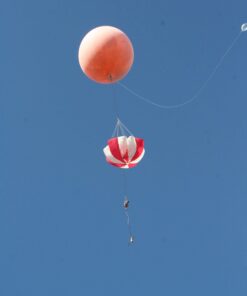Weather balloons are used for atmospheric probing by the Institute of Meteorology and Water Management (IMWM). Every day in three centers – Łeba, Legionowo, Wrocław – IMWM employees send probes to perform measurements that are used to determine the weather conditions for Poland.
The same type of balloons is used to carry out amateur stratospheric missions. Every year, many student groups associated with scientific circles, or simply informal groups, like the Copernicus Project organize flights into the stratosphere.
Individual types of weather balloons are usually encoded in the name itself, which have their own weight, which determines their technical capabilities.
For our and your convenience, we have distinguished 3 groups of balloons:
1. small -> 100g, 200g, 350g
2. medium -> 500g/600g, 800g/875g, 1000g,
3. large -> 1200g, 1500g/1600g, 2000g, 3000g, 4000g
A summary and technical specifications are available in our brochure – recommended weather balloons ( PDF).
So if you choose the CPR-1000 coating, you already know that it weighs 1000g.
We use this data to prepare a flight strategy. On its basis, we can determine the required amount of gas and the possible weight of the capsule itself.
small balloons can be used for technical testing of equipment, i.e. for test flights or sending very light loads, such as the Vaisala RS41 radiosonde.
medium balloons are used to carry out the first ambitious missions. The recommended weight of the load is about 250 g.
large balloons are the ones that allow you to lift loads over 1000g.
This gives us the greatest opportunities to experiment.


